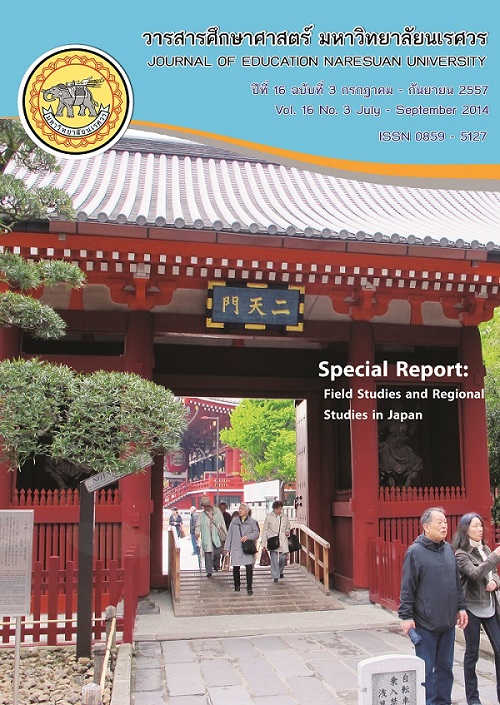ปัจจัยทางจิตสังคมที่ส่งผลต่อการมีจิตสาธารณะของนักเรียนระดับชั้นประถมศึกษาปีที่ 3 สังกัดสำนักงานเขตพื้นที่การศึกษาประถมศึกษาในเขตภาคเหนือตอนล่าง
Main Article Content
Abstract
บทคัดย่อ
การวิจัยครั้งนี้มีจุดมุ่งหมายของการวัย 1) เพื่อศึกษาความสัมพันธ์ระหว่างปัจจัยทางจิตสังคมที่ส่งผลต่อจิตสาธารณะของนักเรียนระดับประถมศึกษาปีที่ 3 และ 2) เพื่อสร้างสมการพยากรณ์ของตัวแปรจิตสังคมที่ส่งผล ต่อจิตสาธารณะของนักเรียนระดับชั้นประถมศึกษาปีที่ 3 สังกัดสำนักงานเขตพื้นที่การศึกษาประถมศึกษาในเขตภาคเหนือตอนล่างกลุ่มตัวอย่าง คือนักเรียนระดับประถมศึกษาปีที่ 3 ในโรงเรียนต้นแบบที่ใช้หลักสูตรแกนกลางการศึกษาขั้นพื้นฐานพุทธศักราช 2551 ในภาคเรียนที่ 2 ปีการศึกษา 2555 จำนวน 341 คน ซึ่งได้มาโดยการสุ่มตัวอย่างแบบหลายขั้นตอน(Multi-stage sampling) เครื่องมือที่ใช้ในการวิจัย ได้แก่ เครื่องมือวัดปัจจัยทางจิตสังคม ประกอบด้วย แบบวัดเกี่ยวกับการมุ่งอนาคตและการควบคุมตน แรงจูงใจใฝ่สัมฤทธิ์ เหตุผลเชิงจริยธรรม ความเชื่ออำนาจในตน การได้รับแบบอย่าง การอบรมเลี้ยงดูแบบประชาธิปไตยและแบบวัดจิตสาธารณะ การวิเคราะห์ข้อมูลใช้การวิเคราะห์สัมประสิทธิ์สหสัมพันธ์พหุคูณ(Multiple Correlation coefficient) และการวิเคราะห์การถดถอยพหุคูณแบบขั้นตอน (Stepwise Regression Analysis)ผลการวิจัยสรุปได้ดังนี้1. ค่าสัมประสิทธิ์สหสัมพันธ์ระหว่างตัวแปรทางจิตสังคมกับจิตสาธารณะของนักเรียนระดับประถมศึกษาปีที่ 3พบว่า ตัวแปรทางจิตสังคมมีความสัมพันธ์ทางบวกกับจิตสาธารณะของนักเรียนอย่างมีนัยสำคัญที่ระดับ 0.01 ทุกตัว โดยมีค่าสัมประสิทธิ์สหสัมพันธ์ระหว่าง 0.330–0.476 และปัจจัยทางจิตสังคมที่มีความสัมพันธ์กับจิตสาธารณะของนักเรียนระดับชั้นประถมศึกษาปีที่ 3 สูงที่สุดคือ การอบรมเลี้ยงดูแบบประชาธิปไตย ( xyr =0. .476) รองลงมาคือ ความเชื่ออำนาจในตน ( xyr = 0.458) และต่ำที่สุด คือแรงจูงใจใฝ่สัมฤทธิ์ ( xyr = 0. 449) มีความสัมพันธ์พหุคูณ (R) กับจิตสาธารณะเท่ากับ 0.543 มีค่าอำนาจการพยากรณ์ ได้ร้อยละ 29.4 มีความคลาดเคลื่อนมาตรฐานของการพยากรณ์เท่ากับ 0.4542. ผลการวิเคราะห์การถดถอยแบบขั้นตอน ปัจจัยทางจิตสังคมที่ส่งผลต่อการมีจิตสาธารณะ ของนักเรียนระดับชั้นประถมศึกษาปีที่ 3 อย่างมีระดับนัยสำคัญทางสถิติที่ระดับ .01 จำนวน 3 ตัว ได้แก่ การอบรมเลี้ยงดูแบบประชาธิปไตย (X6) แรงจูงใจใฝ่สัมฤทธิ์ (X2) และความเชื่ออำนาจในตน (X4) ส่งผลต่อการมีจิตสาธารณะของนักเรียนระดับชั้นประถมศึกษาปีที่ 3 โดยมีค่าสัมประสิทธิ์ สหสัมพันธ์พหุคูณ (R) เท่ากับ 0.537 มีค่าอำนาจการพยากรณ์ได้ร้อยละ 28.9 มีความคลาดเคลื่อน มาตรฐานของการพยากรณ์เท่ากับ 0.453 ซึ่งสามารถเขียนสมการพยากรณ์ ในรูปคะแนนดิบและคะแนนมาตรฐานตามลำดับ ดังนี้
=1.499+0.248X6+0.163X2+0.140X4
=0.248X6+0.192X2+0.184X4
Abstract
The purposes of this research were 1) to study the relationship between Psychosocialfactors affecting on public mind of Prathomsuksa 3 students, and 2) to create the predicted equationand find out the best variable of public mind of Prathomsuksa 3 students under Primary EducationalService area in the lower northern zone. The research sample consisted of 341 Prathomsuksa 3students in the model master schools which were using the Basic Education Core Curriculum B.E.2551 (A.D. 2008.) by using multi-stages sampling. The research instruments were the psychosocialfactors questionnaire which consisted of future oriented scale and self control scale, achievementmotivation scale, moral reasoning scale, Internal locus of control scale, pattern receiving scale,democratic child-rearing scale and the public mind scale. The data was analyzed by Pearsonproduct-moment correlation coefficient, multiple correlation coefficients (R) using Stepwise MultipleRegression Analysis technique.1. The correlation coefficient between psychosocial variable and the public mind variableof Prathomsuksa 3 students revealed that the psychosocial variable and the public mind variablewas positive correlation with statistical significance at 0.01 level, and the correlation coefficientswas between 0.330 to 0.476. The most important weights given by psychosocial factors that relatedto public mind of Prathomsuksa 3 students was democratic child-rearing (xyr = 0.476). The secondwas achievement motivation (xyr = 0.458). The lowest was Internal locus of control (xyr = 0.449) andrelated to the Multiple correlation coefficient (R) was at 0.543. The predictive power was at 29.4percent and a standard error of prediction was 0.454.2. Result from psychosocial factors analysis influencing the public mind of Prathomsuksa 3students by using Stepwise multiple regression analysis founded that 3 Predictors which yieldresults at level of statistical significant .01 as democratic child-rearing (X6), achievement motivation (X2), and Internal locus of control (X4) affecting on public mind of Prathomsuksa 3 students. TheMultiple correlation coefficient (R) was 0.537, and the predictive power was at 28.9 percent, astandard error of prediction was 0. 453. They could be written in the form of the equation in termsof unstandardized scores () and in terms of standardized scores (
) as follows.A predicting formula in terms of unstandardized scores as
=1.499+0.248X6+0.163X2+0.140X4
predicting formula in terms of standardized scores
=0.248X6+0.192X2+0.184X4
Keywords: Psychosocial/ Public Mind
Article Details
The owner of the article does not copy or violate any of its copyright. If any copyright infringement occurs or prosecution, in any case, the Editorial Board is not involved in all the rights to the owner of the article to be performed.


